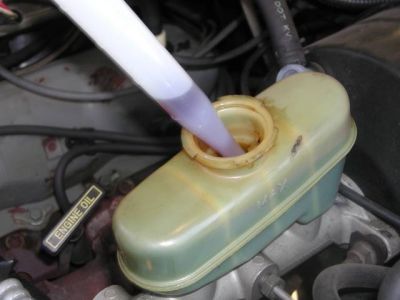Hi,
Replacing brakes isn't too hard to do. First, here is a link that explains in general how it's done. You can use these as a guide:
https://www.2carpros.com/articles/how-to-replace-front-brake-pads-and-rotors-fwd
Here are the directions specific to your vehicle. The attached pics correlate with the directions.
_______________________________________________________
2006 Ford Truck Explorer 4WD V6-4.0L VIN E
Front
Vehicle Brakes and Traction Control Disc Brake System Brake Pad Service and Repair Procedures Front
FRONT
Brake Pads
Material
pic 1
pic 2
pic 3
Removal
WARNING: Use of any other than approved DOT 3 motor vehicle brake fluid will cause permanent damage to brake components and will render the brakes inoperative. Failure to follow these instructions may result in personal injury.
WARNING: Brake fluid contains polyglycol ethers and polyglycols. Avoid contact with eyes. Wash hands thoroughly after handling. If brake fluid contacts eyes, flush eyes with running water for 15 minutes. Get medical attention if irritation persists. If taken internally, drink water and induce vomiting. Get medical attention immediately. Failure to follow these instructions may result in personal injury.
CAUTION: Brake fluid is harmful to painted and plastic surfaces. If brake fluid is spilled onto a painted or plastic surface, immediately wash it with water.
1. Check the brake fluid level in the brake master cylinder reservoir.
If required, remove brake fluid until the brake master cylinder reservoir is 1/2 full.
2. With the vehicle in NEUTRAL, position it on a hoist.
3. CAUTION: Do not pry in the brake caliper sight hole to retract the pistons as this can damage the pistons and boots.
CAUTION: Do not allow the brake caliper to hang from the brake hose or damage to the hose can occur.
Remove the 2 brake caliper bolts and position the brake caliper aside.
Support the caliper using mechanic's wire.
4. CAUTION: Install new brake pads if they are worn past the specified thickness above the metal backing plate or rivets. Install new brake pads in complete axle sets.
Inspect the brake pads for wear and contamination.
5. Inspect the brake disc, machine or install a new front brake disc as necessary.
6. Remove the brake pads and clips.
Discard the clips.
Installation
1. CAUTION: Do not allow grease, oil, brake fluid or other containments to contact the pad lining material. Do not install contaminated pads.
NOTE: One brake disc pad kit contains the pads and pad clips required for both sides.
Install the new brake pad clips and the brake pads.
pic 4
2. CAUTION: Protect the piston and boots when pushing the caliper piston into the caliper piston bores.
Using a suitable tool and a worn brake pad, compress the disc brake caliper pistons into the caliper.
3. Position the brake caliper and install the 2 bolts.
Tighten to 72 Nm (53 ft. lbs.).
4. Fill the brake master cylinder reservoir with clean brake fluid.
5. Test the brakes for normal operation.
______________________
I hope this helps. Let me know if you have other questions.
Take care,
Joe
Images (Click to make bigger)
SPONSORED LINKS
Tuesday, February 9th, 2021 AT 10:10 AM
(Merged)




